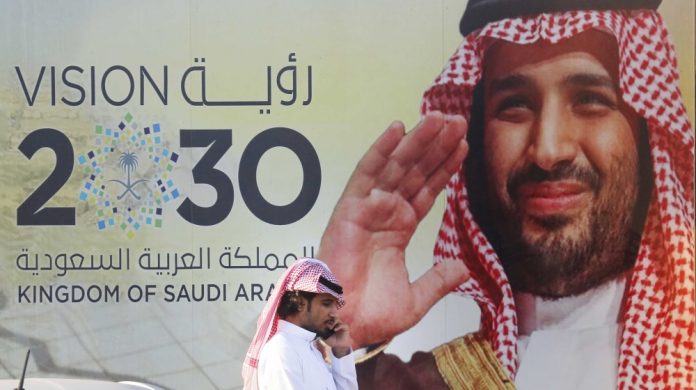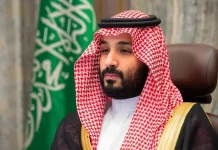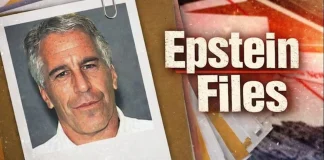[ad_1]
Saudi Arabia has temporarily released two Saudi Americans who were jailed on alleged “terrorism-related” charges after more than 300 days of detention amid a stark change in US policy towards the kingdom.
Salah al-Haider, the son of a leading women’s rights activist and Bader al-Ibrahim, a writer and doctor, were set free on Thursday pending trial, according to campaigner groups.
“This is welcomed progress, even though it is long overdue,” Freedom Initiative’s Bethany al-Haidari said in a statement.
“Bader al-Ibrahim and Salah al-Haider should have never been jailed in the first place and their release should certainly not be on a ‘temporary’ basis.”
🚨BREAKING | Saudi-American political prisoners Dr. Bader al-Ibrahim and Salah al-Haidar have been temporarily released from Saudi prisons after 307 days in arbitrary detention.
This is welcomed progress that we hope is built on for the release of others.
Full statement 👇🏽 pic.twitter.com/itFIgaO0hR
— The Freedom Initiative (@thefreedomi) February 4, 2021
The two dual nationals were arrested in April 2019 and charged with “terrorism” related charges. Their next court case is set for March 8 this year in Saudi Arabia’s Specialized Criminal Court (SCC).
“They have been detained, separated from loved ones, and tried as terrorists for simply expressing their views. Peaceful dissent is not terrorism,” al-Haidari added.
The news of their release was confirmed by Prisoners of Conscience human rights group as well.
🔴 BREAKING
Saudi authorities release the doctor and media figure Bader Al-Ibrahim, after about 2 years of arbitrary detention. He holds the American citizenship and he was detained in April 2019.#بدر_الإبراهيم pic.twitter.com/KRMoZWPRbU— Prisoners of Conscience (@m3takl_en) February 4, 2021
🔴 BREAKING 2
Saudi authorities release the media figure Salah Al-Haidar (son of Dr. Aziza Al-Yousef), after about 2 years of arbitrary detention. He holds the American citizenship and he was detained in April 2019.#صلاح_الحيدر pic.twitter.com/tgdT5L4DmV— Prisoners of Conscience (@m3takl_en) February 4, 2021
Campaigners accuse the kingdom of using the SCC, or anti-terrorism court, to silence critical voices under the cover of fighting “terrorism”.
“We welcome and are closely monitoring the conditional release of US citizens Badr Al-Ibrahim and Salah Al-Haider,” a State Department spokesperson told the AFP news agency on Thursday.
Last month, a Saudi appeals court upheld the conviction of prominent Saudi American doctor Walid Fitaihi on charges that included “disobedience” against the kingdom’s rulers, a source close to his family told the AFP.
But the Harvard-educated doctor will effectively serve no jail time after the court reduced his six-year jail term handed down in December by half, and suspended a part of the remaining sentence, the source said.
Fitaihi, who still faces a travel ban and an assets freeze, has already served nearly two years in pre-trial detention.
The State Department spokesperson also welcomed the reduction of Fitaihi’s sentence.
“We remain in close contact with family members and we will continue to advocate for a swift resolution” of all three cases, they added.
‘A pariah’
Saudi authorities have not officially commented on the pair’s detention, charges or provisional release, which comes after Saudi Arabia accelerated political trials following US President Joe Biden’s election victory late last year.
Under Crown Prince Mohammed bin Salman (MBS), the kingdom’s de facto ruler, Saudi Arabia has detained activists, religious leaders and royal family members in a sweeping crackdown on dissent over the last three years.
The detentions have cast a spotlight on the human rights record of the kingdom, an absolute monarchy which has also faced intense criticism over the 2018 murder of journalist Jamal Khashoggi in its Istanbul consulate.
Marking a stark U-turn from his predecessor’s friendly approach towards Saudi Arabia, Biden pledged to make the kingdom a “pariah” over its human rights failings and made it clear the US would have reassessed its relations with Saudi Arabia “to make sure America does not check its values at the door to sell arms or buy oil”, he said in October.
On Friday, Biden announced an end to the US support for Saudi-led military offensive operations in Yemen highlighting a major humanitarian crisis.
A quarter of US weapons sales in the five years between 2014 and 2019 went to Saudi Arabia, up from 7.4 percent in 2010-2014, according to the Stockholm International Peace Research Institute.
Saudi Arabia began its military involvement in the war in Yemen in March 2015 which killed tens of thousands of people, including large numbers of civilians, and created the world’s worst humanitarian crisis.
[ad_2]
Source link











